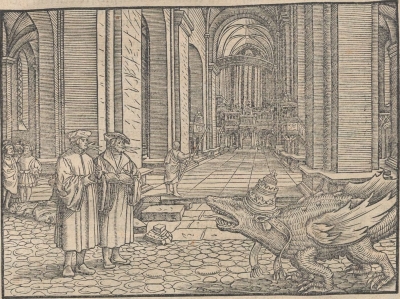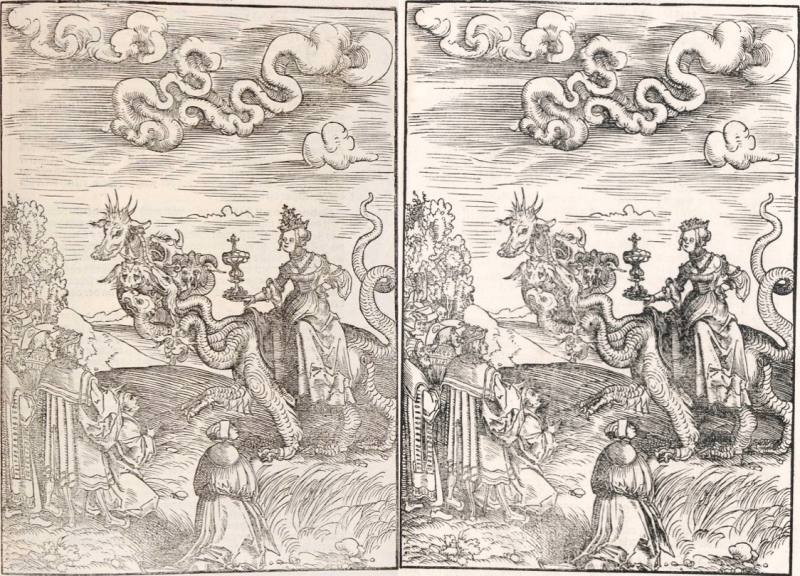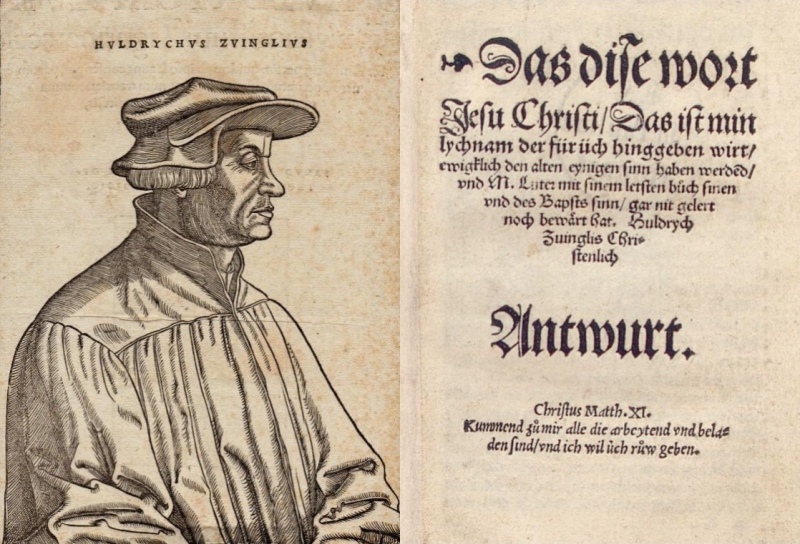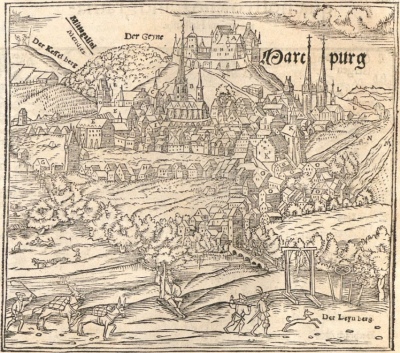The First Lutheran Martyrs’ Sixty-Two Articles
July 1, 2023 Leave a comment
Translator’s Preface
Read the preface to the First Account for more information on Hendrik Voes and Jan van den Esschen and the circumstances leading up to and surrounding their execution. Read the preface to the Second Account for more information on the source of the sixty-two articles below.
The content of these articles clearly shows that they were compiled by a member of the Inquisition, and doubtless before the two monks were degraded and burned, though how it was obtained or copied so that it could be printed and disseminated is unknown.
I am deliberately presenting these articles today, the five hundredth anniversary of the degradation and burning of Hendrik Voes and Jan van den Esschen. These are the articles of truth for which these first Lutheran Christian martyrs willingly gave up their lives. To my knowledge, they have never before appeared in English in their entirety. May the triune God give Christians today the same conviction of the truth and the same perseverance and steadfastness, even to the point of death, that he gave to these two young men.
Articles Asserted by Brother Hendrik and the Others
- No one is obligated to abstain from reading the books of Luther by the mandate of the pope or the emperor.
- Those commanding us to abstain from reading the books of Luther are commanding more than the Spirit of God requires.
- Those commanding us to abstain from reading the books of Luther are acting contrary to the Scripture passages, “Test everything” [1 Thess. 5:21], and, “Test the spirits and see whether they are from God” [1 John 4:1].
- In a manner insulting to the commissary, he tells him that he [the commissary] was trying to deceive him with flattering words.
- The books of Luther showed him the light of Sacred Scripture more than other teachers whom he had read.
- Luther brought him closer to the gospel of Christ than Augustine or Jerome.
- It cannot be proven from Sacred Scripture that the pope or any bishop possesses anything beyond simply the ministry of the word of Christ.
- Neither the pope nor any other bishop is able to command or forbid something else that Sacred Scripture does not contain or that God does not command or forbid, if the conscience would be injured by it.
- Secular authority can command and prohibit such things with respect to bodies, but not with respect to the conscience.
- The church has not yet forbidden the books of Luther. And after the passages, “Test everything,” and, “Test the spirits and see whether they are from God,” were explained to him, he found a way into the same point, saying, “The church has not rejected the books of Luther.”
- Some articles [taught by Luther] are found condemned in Pope Leo the Tenth’s bull even though they are true, and are thereby wrongly condemned until he [Hendrik] was better instructed.1 And he gave examples of this:
- All people2 are priests before God.
- All people are able to remit the sins of any Christian whatsoever, if they know how to fraternally admonish their neighbor.
- Women are able to absolve people of their sins. He deduces this from the evangelical absolution contained in the passage: “If your brother sins against you, etc.” [Matt. 18:15].
- The evangelical authority contained in the passage, “Those whose sins you remit, etc.” [John 20:23], is an authority common to all people.
- In the mass, the body of Christ is not sacrificed by man, since what is given to him as a medicine and remembrance is not sacrificed.
- When interrogated whether the words of the canon of the mass are false, he says, “Whatever the case may be with the words of the canon, the body of Christ is not sacrificed in the mass, but is only taken in memory of him.”
- He does not know whether the bread remains in the sacrament of the Eucharist after the consecration of Christ, and when the text of Chapter Damnamus of “De summa Trinitate & fide catholica” from canon law was cited,3 he responded, “If it can be found in the Sacred Scriptures, then I believe that, otherwise I do not.”
- Nothing should be believed, at risk to the conscience, except what is recorded in the words of God, or what can be drawn out from the words of God.
- If a council should define something4 that is not contained in Sacred Scripture, it should be treated with suspicion.
- He refused to respond any further whether he should believe [what canon law said] or not.5 But after being repeatedly interrogated, he said that whatever the case may be with Martin Luther, he knows and says that he has come to know the gospel through his writings. When he was interrogated whether Martin Luther himself had the Spirit of God, he refused to respond.
- When interrogated if he thinks there is a difference between the priests and the laypeople in the consecration of the Eucharist, and whether consecrating belongs to the priesthood of Christ and to the priesthood of the New Testament, he said he did not understand [intelligere].6
- He insultingly said, “Christ will mark well your threats,” etc.
- If everyone had considered the matter well up till now, all laypeople would have been regarded as priests just as much as those consecrated as priests by themselves [namely, by bishops].
- He did not understand [intellexit] whether a bishop who consecrates someone for the priesthood imparts any new power to consecrate [the elements of the Eucharist].
- It is greater to take the body of Christ, which is fitting for all the faithful, than to consecrate it, which only belongs to the administration of the Sacrament itself. He did not understand, however, whether a layman, if a bishop were to tell him to consecrate the body of Christ, could do so without any other ordination.
- It is not part of God’s law nor is it commanded by God that all mortal sins should be confessed to a man, since no human is able to know his sins [Ps. 19:12], much less confess them.
- Baptism, the Eucharist, and repentance rest on the promises of Christ, which kindle faith. He therefore believes that they confer faith and grace.7
- The other four sacraments—confirmation, ordination, marriage, and last rites—do not have a word of promise, but are rather anciently observed rites. Therefore they do not confer grace and can be relinquished as non-sacraments.
- The just-mentioned sacraments do not confer any more grace than other rites of the church that the church does not regard as sacraments, since grace is conferred by the word of God alone.
- The priesthood is not a sacrament. It is nevertheless a necessary ministry.
- Last rites does not have a promise.
- Neither the pope nor a bishop nor any other prelate in the church whatsoever is able to obligate a person to things that are not included in God’s law, so that the person would commit a mortal sin by transgressing them. They cannot, for example, obligate anyone to fast during Lent, to confess their sins once a year, to celebrate feast days, etc., excluding offense to brothers.8 This was his position until he was better instructed.
- Christ works every good work in humans and through humans, so that humans do nothing good actively. They rather merely allow Christ to work in them as his instruments.
- The Roman pontiff, the successor of Peter, was not instituted by Christ himself in the person of blessed Peter as Christ’s vicar over all the churches in the whole world. For Christ did not institute a vicar, but a minister as the highest pontiff.9
- All perpetual vows made outside of Christ’s command, such as the vows of the monastics, have been imprudently made out of ignorance of Christian liberty, and thus are not binding.
- Now that he has become familiar with Christian liberty, he does not think that his conscience is restrained by vows.
- The true, Christian, and catholic10 faith is not able to be separated from love, since love is a fruit of faith, and Christian faith without love is dead.
- The sacrament in the mass only benefits the recipient.
- When God releases the sinner from his sins, then for the sake of Christ’s death he also releases him from every penalty his sins deserve. And he devoutly believes this.
- He does not know whether or not there is a purgatory.
- He said, “My lords, you have dealt with us unfairly, and not according to the gospel.”
- The sacrament of the Eucharist does not contain a sacrifice on the altar; the sacrifice was only made once on the cross.
- After the sinner has confessed and been absolved, he is not obligated by divine law to any penance, provided that he does not offend a brother Christian by causing him to stumble, or offend the church by some public or private crime. Repentance therefore only consists of two parts.
- He does not know whether the prayers of the living benefit the dead.11
- It is better to observe the manner of celebrating mass that the church observed in its earliest days than to be entangled in these regulations that have been issued apart from God’s command.
- These regulations made by the church regarding the mass have been instituted contrary to the command of God and of Christ.
- If the just-mentioned regulations or ceremonies have been put in place by humans and do not originate with a divine command, then they are contrary to divine law.
- We are not obligated to read the canonical hours on pain of committing mortal sin.
- He himself always acted contrary to God’s law when reading the canonical hours, since he never prayed to the Father in spirit and truth [John 4:23–24].
- He would prefer to be beheaded, even if he had ten heads,12 than to respond to the questions put before him.
- If a sinner believes that he is truly absolved, then he is released from his sins.
- It is better not to deny the laypeople what Christ left behind to be distributed to everyone, that is, Communion in both kinds.
- Those who prohibit the laypeople from being communed in both kinds are acting contrary to God’s intention.
- The words of consecration should be spoken loudly.
- When interrogated whether the saints may be adored, he said that he did not wish to respond any further.
- When interrogated whether he had been led astray by Luther (and such interrogations are being put before him because it is feared that he has been led astray by Luther), he said, “I have been led astray just as much as Christ led his apostles astray.”
- It is contrary to divine law that the clergy are exempt from the jurisdiction of the emperor.
- The pope does not have any other authority than to preach God’s word and to feed his sheep with the preaching of God’s word.
- He sees well that the word of God is not in the esteemed commissaries.
- He cares little for life. He commends his soul to God.
- He did not understand how he could solemnly renounce each and every error he had confessed. And when he was demanded and ordered to renounce them, he refused.
Source
Anonymous. Historia de Duobus Augustinensibus, ob Evangelii doctrinam exustis Bruxellae, die trigesima Iunij. [sic] Anno domini M. D. XXIII. Articuli LXII. per eosdem asserti. Basel: Andreas Cratander, 1523. Fols. a 4 verso—a 7 verso.
I also consulted two German translations:
Reckenhofer [printed Heckenhofer], Martin., tr. and ed. Dye histori / so zwen Augustiner Ordens gemartert seyn tzu Bruxel in Probant / von wegen des Evangelj. Erfurt: Wolfgang Stürmer, 1523. Fols. A iii recto—H iv recto.
Rabus, Ludwig. Historien der Heyligen Außerwölten Gottes Zeügen / Bekennern vnd Martyrern. Vol. 2. Strasbourg: Samuel Emmel, 1554. Fols. 117 verso—121 verso.
Endnotes
1 This phrase, which appears again later, does not imply that Hendrik thought he was poorly educated. It rather has the sense: “until he was proven wrong from clear and thorough demonstration from the Scriptures.”
2 That is, all Christians, not just ordained priests. This sense of “all people” also applies to Articles 13 and 15.
3 Either the interrogator or the recorder cited the incorrect chapter from canon law. The Corpus Juris Canonici (Body of Canon Law) was generally published in six collections at this time. The first was Gratian’s collection of church laws and decretals, the Decretum Gratiani. The second was a five-book collection of decretals promulgated by Pope Gregory IX, the Decretales Gregorii Noni. The third was a collection of decretals compiled by Pope Boniface VIII, the so-called Liber Sextus. The fourth was the Constitutiones Clementinae or Clementine Constitutions of 1314. The fifth was a collection of supplementary decretals of Pope John XXII, the Extravagantes Joannis XXII, and the sixth another collection of supplementary decretals, the Extravagantes Communes. The chapters cited from canon law were commonly named after the first word of the chapter. The chapter cited here is Chapter 2, Damnamus, of Title 1, “De summa Trinitate & fide catholica,” of the Decretales Gregorii Noni. However, the topic under discussion—the presence (or lack thereof) of Christ’s body and blood and of the earthly elements in the Eucharist—is discussed in Chapter 1, Firmiter, of Title 1. See, e.g., Decretales D. Gregorii Papae IX (Rome, 1582), col. 10.
4 In Catholicism, to define something is to make an irrevocable decision and decree about something pertaining to faith or morals, which is binding for the whole Catholic Church.
5 This seems to refer back to Article 18. Articles 16–21 are closely related in thought.
6 This could also be translated: “he said he did not see any difference.” However, the repeated use of “he did not understand” in subsequent articles makes clear that “not understanding” is a pregnant, disparaging version of “not knowing.” Whoever recorded these articles wanted to imply that the monks not only did not know the answer (the fault of which could potentially be the unclarity of the interrogators or the convoluted content of their questions), but did not know the answer because they were simpletons lacking in education and intelligence.
7 Latin: ideo credit eorum fidem & gratiam conferre. Reckenhofer translates: hyerumb glaubtt ehr das der glaub bey den selben auch gnad bring—“he therefore believes that the faith accompanying the same [namely, these sacraments] also brings grace.
8 In other words, one should not rashly forgo such customs at the expense of a brother or sister Christian’s conscience.
9 Rabus’s translation switches the objects and predicate: “For Christ has not instituted supreme bishops to be vicars [or substitutes], but rather servants and ministers.”
10 Latin: catholica. Reckenhofer translated this word gemeyn.
11 Rabus incorrectly translates: “He does not know whether the intercession of the dead is of any benefit to the living.”
12 Lit.: “He would prefer that his neck be cut off, even if he had ten necks.”
 race and peace in Christ!
race and peace in Christ!











